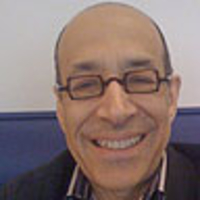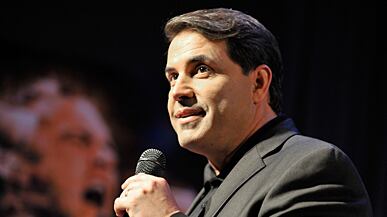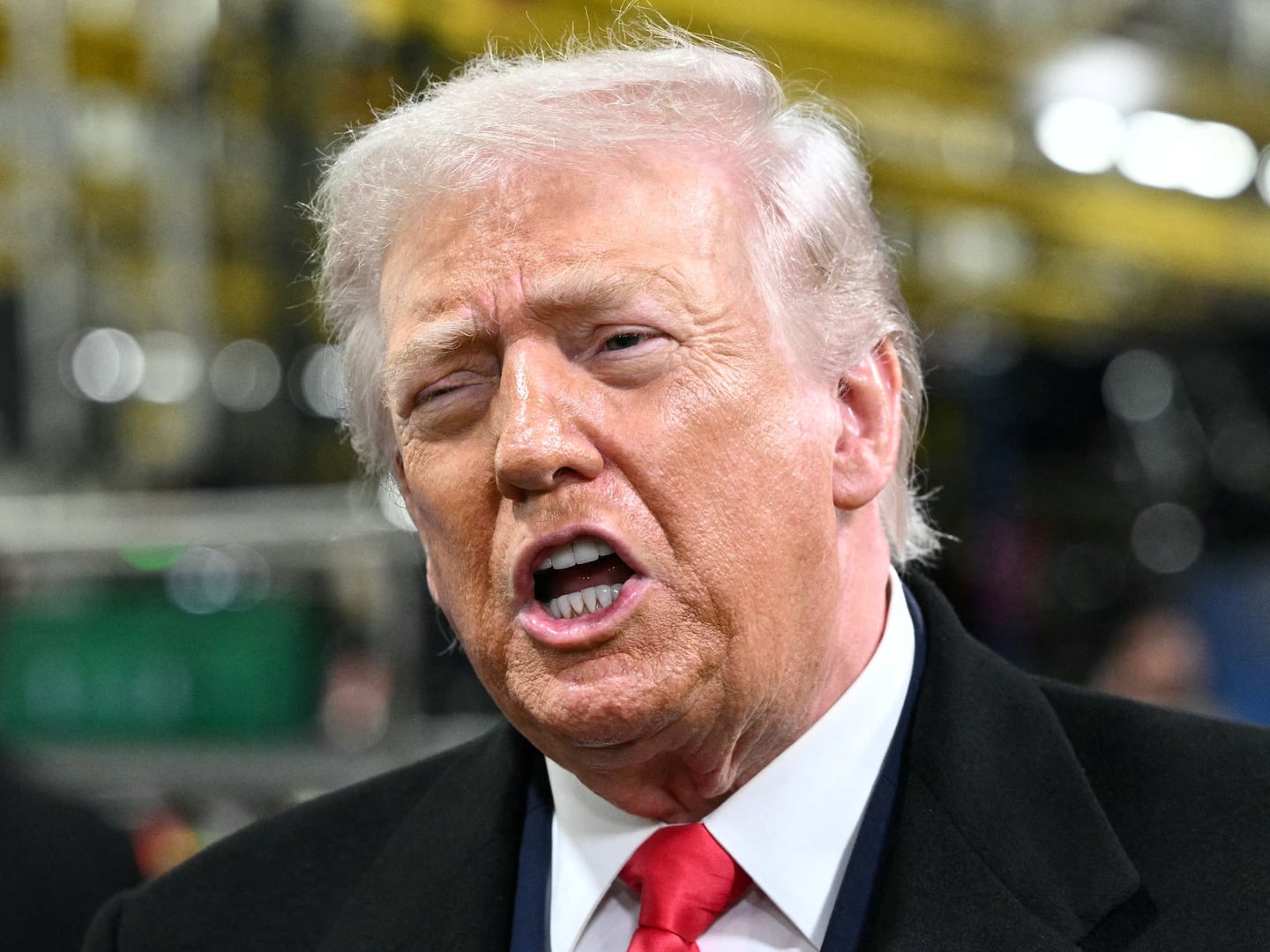Rick Sanchez’s parents didn’t speak any English, but he makes up for it. His words come in a torrent, an id-gush; I imagine his superego watching with its usual resignation from the balcony.
Sanchez made himself available last week for his first interview since a brief appearance on Good Morning America in the immediate aftermath of being fired by CNN for the now-famous interview on Sirius XM radio in which he labeled Jon Stewart a “bigot.”
You might think that following the trouble he got into for shooting off his mouth, Sanchez would speak with the lapidary precision of an oil company executive testifying before Congress. But he was voluble and unguarded. Sanchez takes full responsibility for the interview, describing it as “careless, “mangled” and “sloppy.” At the same time, his contrition was matched by a passionate and full-throated defense of his intentions. Getting canned hasn’t rendered him toothless or humble.
Sanchez is easily bruised. He speaks about the wounds of growing up poor, how they mark him as a perennial outsider—at least in his own psyche. But Sanchez is optimistic about his future, which is a good sign for the media, which needs a shock to its sameness. At the same time, he's learning more about his own demons.
Excerpts from our conversation:
The Daily Beast: Rick, how are you doing?
Sanchez: It’s been traumatic. I’m just starting to deal with this emotionally because it immobilized me so much, it happened so fast and furious that I was afraid to confront it. I shut down the last couple of months. I couldn’t read the horrible press. It was just too painful. We all want to show a little bravado, so we end up kind of disguising our feelings in many ways. So yeah, this process of talking about it is going to be good for me.
The Daily Beast: When was the last time you listened to the Sirius interview that started it all?
Sanchez: It’s only recently that I went back and listened to the interview. Isn’t that interesting? I couldn’t get myself to listen to it…
My wife and I actually sat down a week and a half ago after we put the kids to bed and said, “Let’s listen to this tape.” We heard the entire interview. I thought it would destroy me, but it actually empowered me because when I heard it, and I read what was written, they didn’t match up.
“I never said that Jews controlled the media,” Sanchez says. “Never said it. My whole conversation was about empowerment and that suddenly was taken in a different direction.”
The Daily Beast: What’s an important example of where the coverage got it wrong?
Sanchez: I never said that Jews controlled the media. Never said it. My whole conversation was about empowerment and that suddenly was taken in a different direction. And if you listen carefully, there’s a lot of nuance in the conversation. The argument that I was truly, truly making was insider versus outsider. Because throughout my career I have felt like an outsider, and have been made to feel like one. Often because I was brave enough to try to be not like everybody else.
The Daily Beast: Well, the media may have distorted elements of the interview, but you weren’t proud of everything you said, were you?
Sanchez: I was appalled. That was part of my being tired, being angry, being careless and in many ways I brought it on myself by being sloppy. So I want to now clear the record. I want to say, “Look, this is who I am and this is who I’m not.”
The Daily Beast: Did the media itself do a fair job of covering the Rick Sanchez affair?
Sanchez: Who’s looked at my record? How many journalists have gone out there and said, “Let’s see if there’s something to this?” Why haven’t they reported about the stories I’ve done, chasing neo-Nazis around the country and talking about hate rock? Why didn’t they look at the recent story where I defended the Israeli commandos’ right to defend themselves? Why don’t they find out who [I hang] around with?
The Daily Beast: Do you realize you just defaulted to, “Some of my best friends are Jewish?”
Sanchez: Yeah, forgive me if I tried to sound like I have a lot of friends who happen to be Jewish. But I would have liked for people in my own profession, for writers, to look around and say, “OK, well, who is this guy? Is there any history of him ever being a person who is hateful?
The Daily Beast: Can you see that you created a narrative about Jon Stewart growing up in a privileged world which many found offensive and stereotypical?
Sanchez: And it was wrong of me to do that. But what I was trying to say was, “I grew up a poor kid in Hialeah whose parents had no money. We literally had to eat government cheese. We were on refuge assistance. And I feel like that makes me different than...” and I chose Jon Stewart.
By the way, when I finally sat down and talked to Jon Stewart, he goes, “Hey, by the way, I didn’t grow up very wealthy. My mom and dad had a tough time, and I grew up with a single mom, and that wasn’t easy for me, too.” He made me understand the errors of my ways…
The most painful part is being called something that you know in your heart that you are not, when you were trying to make a broader point about the media and about the times we live in, which got turned into Rick Sanchez is an anti-Semite. That is painful, it is wrong, and the burden is now on me to make sure it’s right.
The Daily Beast: How are you dealing with that burden?
Sanchez: First, that I apologize. I swear to God I deeply apologize to anyone who felt offended by those words, because I get it. I truly, truly get it…
The Daily Beast: If I was going to trace this whole media circus back to its origin, a big trigger was the way Jon Stewart’s mockery got under your skin.
Sanchez: Now we’re getting to where the rubber hits the road. I’ll give you a perfect example—and that’s Jon Stewart repeatedly making fun of because I let myself be tased in a story I was researching…
What was told about Rick Sanchez in that story? Does anyone know that as a result of it, police departments called to thank me? No. It was all about saying, “Look, there’s Rick Sanchez being tased. Ha, ha, ha, ha, ha…. What a moron!”
The Daily Beast: So the taser satire was psychologically traumatizing?
Sanchez: I wish I could lie to you and say it wasn’t. Look, when you grow up poor, and you work really hard and achieve something, it’s important to feel some respect. But I personally started to feel disrespected, that that caused me—because of my heart, my sinew—to overreact. It was ridicule without recourse. I’m trembling as I say this. It made me angry. I’m the one person who Jon Stewart chose in his role as both statesman and satirist to ridicule the most. I overreacted and paid dearly for it. I screamed and I got fired… I’ve always felt like I didn’t belong. But many of us may feel that way. When I look in the mirror I still see a poor little Hispanic kid who isn’t respected, and it caused me to think that everybody else around me, because they didn’t experience what I had, didn’t get me, and therefore they were making fun of me and ridiculing me. Then one day I lashed out.
The Daily Beast: Is there a chance you were obsessing a bit too much about this?
Sanchez: You know, my wife told me the other day: “Honey, why do you feel so put upon? You have 150,000 people on Twitter. You had some of the highest ratings on CNN. You were succeeding. Instead of focusing on the people who love you and were supporters, why did you put so much attention on the one guy who said something negative or the one bad tweet?
I told her, “It’s part of who I am.” And frankly, you’re right, it’s something that I am trying to overcome. Guilty as charged.
The Daily Beast: If you could to say it all over, what would you say?
Sanchez: That Jon Stewart is an insider, that I’m an outsider, and that Jon Stewart doesn’t get me. And as a result of not getting me, he ridicules me on a nightly basis and brings along a lot of other people who then also don’t get me, which hurts me, hurts my reputation, and allows me to be publicly disrespected. That’s all I was saying. And it had nothing to do with religion or anything else.
The Daily Beast: President Obama recently called Jeffrey Lurie, owner of the Philadelphia Eagles, to congratulate him for giving Michael Vick a second chance. Did you think about that in terms of where you are now?

Sanchez: Every day. I think about not just Michael Vick. When you go through something like I have, you pull for a lot of people who have made mistakes. But I was moderate. I tried to be fair. I made mistakes just like the next guy, but I haven’t robbed a bank and I don’t think my sin is worthy of me being left on an island somewhere.
The Daily Beast: You’re not happy with the face of the news business today, are you?
Sanchez: Why don’t we have a Hispanic or Asian or African-American voice anywhere in prime time? It doesn’t seem like it fits the census. It conflicts, in fact, but nobody talks about it, and I did. When I watch the news, it seems like the same arguments are being made by the same people, the pundits look the same, they sound the same, the anchors look the same and sound the same, almost like everyone’s reading from the same script…
I was taking a profession that every day looks more and more like our grandfather’s Oldsmobile, and tried to put mag wheels on it. I was trying to make it more accessible to immigrants, to African-Americans, to young people who rely on social media and the Internet, to people who don’t necessarily see the United States exactly like people who grew up within 100 miles of an Ivy League zip code.
The Daily Beast: Where will Rick Sanchez’s expressiveness—hopefully a little less thin-skinned—show up next?
Sanchez: Obviously I can’t get into specifics. But I’m having some very promising conversations with some people in the business to create a platform for me that I could revel in it. I would cherish that. I can’t put a timetable on it because things like this go through the conceptualization stage first before they actually get to fruition, and right now we’re somewhere in between conceptualization and discussions. That’s kind of where I need to leave it…
In the process of dealing with this, I kind of like what I’m becoming. Before I got fired I was gnawing at the edges of my expressiveness or my brazenness. I’ll probably end up being better on the air when I get back on.
Adam Hanft is a decoder of the consumer culture and our branded planet. He blogs for The Huffington Post and FastCompany.com. He is also the co-author of Dictionary of the Future and is founder and CEO of the marketing and branding firm Hanft Raboy. Follow him at Twitter.com/hanft.





